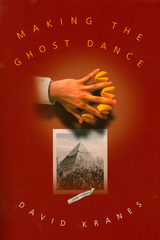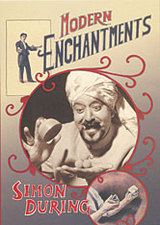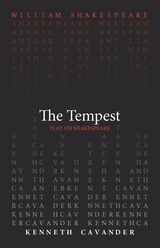
“For the record, I am in this book and you are in this book. When they make the movie, it’s going to feature everybody. David Kranes writes from the marrow, and this novel is fierce and crammed with heart. It’s cerebral and cinematic, and if feels—like all of Kranes’ prose—like something new and something old. A man loves his life in the ways he can, and Peck’s ways are rich. I would say this book is about family and love and time. But it isn’t about something, it is something! If I were with you now, I’d put it in your hand. Wait, fortune, it has already appeared! So, now you’ll see what I mean.” —Ron Carlson, author of A Kind of Flying.

Magic, Simon During suggests, has helped shape modern culture. Devoted to this deceptively simple proposition, During's superlative work, written over the course of a decade, gets at the aesthetic questions at the very heart of the study of culture. How can the most ordinary arts--and by "magic," During means not the supernatural, but the special effects and conjurings of magic shows--affect people?
Modern Enchantments takes us deeply into the history and workings of modern secular magic, from the legerdemain of Isaac Fawkes in 1720, to the return of real magic in nineteenth-century spiritualism, to the role of magic in the emergence of the cinema. Through the course of this history, During shows how magic performances have drawn together heterogeneous audiences, contributed to the molding of cultural hierarchies, and extended cultural technologies and media at key moments, sometimes introducing spectators into rationality and helping to disseminate skepticism and publicize scientific innovation. In a more revealing argument still, Modern Enchantments shows that magic entertainments have increased the sway of fictions in our culture and helped define modern society's image of itself.

Cavander’s translation of The Tempest, which premiered at the Alabama Shakespeare Festival in 2017, was written as part of the Play On! Shakespeare project, an ambitious undertaking from the Oregon Shakespeare Festival that commissioned new translations of 39 Shakespeare plays. These translations present the Bard’s work in language accessible to modern audiences while never losing the beauty of Shakespeare’s verse. Enlisting the talents of a diverse group of contemporary playwrights, screenwriters, and dramaturges from diverse backgrounds, this project reenvisions Shakespeare for the twenty-first century. These volumes make these works available for the first time in print—a new First Folio for a new era.

Shakespeare’s Twelfth Night centers on power and love. One of the most perennially produced of Shakespeare’s comedies, it talks about shipwrecked twins, gender-bending romance, and a bumper crop of fools, from the wise to the ridiculous. Modernizing the language of the play, Alison Carey’s translation revives the joy of this comedy, taking the archaic humor and renewing it for a contemporary audience.
This translation of Twelfth Night was written as part of the Oregon Shakespeare Festival’s Play On! project, which commissioned new translations of thirty-nine Shakespeare plays. These translations present the work of “The Bard” in language accessible to modern audiences while never losing the beauty of Shakespeare’s verse. Enlisting the talents of a diverse group of contemporary playwrights, screenwriters, and dramaturges from diverse backgrounds, this project reenvisions Shakespeare for the twenty-first century. These volumes make these works available for the first time in print—a new First Folio for a new era.
READERS
Browse our collection.
PUBLISHERS
See BiblioVault's publisher services.
STUDENT SERVICES
Files for college accessibility offices.
UChicago Accessibility Resources
home | accessibility | search | about | contact us
BiblioVault ® 2001 - 2024
The University of Chicago Press









